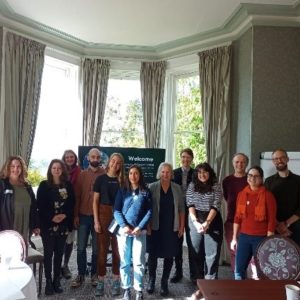
Gaia theory, developed by the visionary James Lovelock, proposes that the Earth is a self-regulating system that maintains the conditions for life on our planet. This theory has the potential to offer solutions to some of the most pressing environmental and social challenges of our time. That’s why on the 23rd and 24th of March, the University of Exeter hosted the Gaia Workshop, a two-day event that brought together academics and business people to explore the power of Gaia theory in promoting sustainability and resilience.
For those who are new to Gaia theory, it proposes that the Earth’s living and non-living systems are interconnected and self-regulating, forming a complex and dynamic system that maintains the conditions for life on our planet. Gaia theory suggests that life on Earth has influenced the environment and the atmosphere to such an extent that it has become a self-regulating system, actively sustaining life in all its forms. Self-regulating systems are systems that have a mechanism to maintain a balance or equilibrium within the system, often through feedback loops that respond to changes in the system. Some examples of self-regulating systems include:
- The human body: The human body maintains a balance of various chemical and physiological processes through various feedback mechanisms, such as the regulation of body temperature, pH balance, and blood sugar levels.
- Ecosystems: Natural ecosystems are self-regulating systems that maintain a balance of different species and populations through various feedback mechanisms. For example, predator-prey relationships help regulate the population of different species within an ecosystem.
- Technology: Some technological systems, such as thermostats and automatic control systems, are designed to be self-regulating, maintaining a specific set of conditions or parameters within a system.
The Gaia Workshop was an exciting and stimulating event that offered a space for creative thinking and constructive dialogue. Participants engaged in workshops, discussions, and talks that explored the potential of Gaia theory in addressing some of the most pressing environmental and social challenges of our time.
One of the highlights of the event was the talk by astrophysicist Emma Puranen, who presented a compelling case for the use of science fiction as a tool for exploring our planet’s past, present, and future. She argued that science fiction provides us with a mirror that allows us to reflect on our world and the challenges we face. By using Gaia theory as a framework for understanding our planet better, we can imagine a better future and work towards it.
The Gaia Workshop was not just an academic event; it also provided an opportunity for creative exploration. Participants engaged in creative writing workshops and used their imagination to explore the potential of Gaia theory in addressing socio-economic resilience. Some participants wrote poems that will be shown at COP28. Through these activities, participants learned how to communicate the importance of Gaia to a broader audience and the role that businesses, NGOs, and Universities can play in promoting sustainability.
‘I loved participating in the workshop, it gave me thinking and breathing space to consider how Gaia theory can become a tool of empowerment for me as a climate activist through a range of creative and collaborative sessions. It has been wonderful connecting with academics to explore some of the big questions around the climate crisis and consider our pathways to action’.
– Emma de Saram, Vice President for Liberation and Equality at the Students Guild
The Gaia Workshop was a resounding success, thanks to the dedication and hard work of the organizing team. The event provided an opportunity for participants to explore Gaia theory from multiple perspectives, and the discussions and workshops sparked new ideas and collaborations. The follow-up events and activities that are planned will offer further opportunities for learning and engagement.

It was an inspiring and thought-provoking event that showcased the potential of Gaia theory in promoting sustainability and resilience. By bringing together academics and business people, the event demonstrated the importance of interdisciplinary collaboration in addressing the complex challenges facing our planet. We look forward to the follow-up events and activities and the continued exploration of Gaia theory’s potential!
